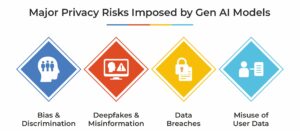The Nano Banana AI trend has taken social media by storm. Users are enthusiastically embracing Google’s latest image editing tool, which transforms ordinary photos into visually stunning creations using simple prompts. This surge in popularity reflects a growing fascination with AI-powered creativity.
But while participating in the trend, are you considering the privacy factors?
Lately, there has been an increase in AI-related security breaches, where AI models were found storing and processing user data for model improvement. On many occasions, users weren’t aware of such a process.
Additionally, AI’s capability to fabricate reality, distorting the individual identity of people, is another alarming concern. While the Nano Banana image generation is in the buzz, experts issue a warning regarding possible privacy and safety threats.
Let us find out how following the latest AI trends can put us in unwanted circumstances...
A Closer Look into the Viral Nano Banana AI Trend:
Google introduced the anticipated Gemini 2.5 Flash Nano Banana update on August 26, 2025, with the capability to generate photorealistic masterpieces. Costume or location change, multi-turn editing, photo blending, and design mix-ups are the key features of this state-of-the-art model. Its unique approach blends real photos with the fantasy world flawlessly.
Soon after the launch of the Nano Banana model, users took the results to social media platforms, initiating a trend all across the globe. Individuals created appealing 3D figurines and aesthetic portraits of themselves by uploading their photos and prompting.
Here are what users can experience through Google’s latest image editing AI mode:
- Convert personal selfies into high-quality 3D models.
- Apply custom edits and formats, like a retro look to pictures.
- Transform and generate AI-driven aesthetic portraits.
- Label content using filters that add invisible watermarks, like SynthID.
Why Experts are Concerned About the Nano Banana Trend?
There are several factors responsible for raising concerns related to Nano Banana AI. While Google ensured transparency with the SynthID watermark, many experts question the credibility of this feature. Ben Colman, the CEO of Reality Defender, remarked, “Watermarking at first sounds like a noble and promising solution, but its real-world applications fail from the onset when they can be easily faked, removed, or ignored.”
Saikat Datta, CEO of DeepStrat, stated, “When you upload a face image, the identity management issue has to be taken care of. The platform may store it for processing, improving models, or analytics. Even if anonymised, there is a potential for your data to be used in ways you did not intend. If the system or any linked services get breached, your images could be leaked online.”
The Nano Banana AI trend gained popularity everywhere. In India, specifically, the trend is in full swing, allowing users to transform and generate a fabulous version of their images. As the retro-Bollywood trend gains traction nationwide with Nano Banana AI, one user shared a shocking experience with the tool.
Jhalakbhawani, an Instagram user from India, asked Gemini to transform her image into a retro-Bollywood portrait in a saree. Though she uploaded a photo of her with her arm covered, Gemini generated an image with a mole on her shoulder, which she actually has.
The user writes, “I noticed something strange, there is a mole on my left hand in the generated image, which I actually have in real life. The original image I uploaded did not have a mole. How did Gemini know? You can see the mole; it’s very scary and creepy. Please be careful.”
This strongly questions the privacy regulations of the AI models like Gemini. Since such models are trained on a large amount of real-time data. To retrieve data, companies use multiple strategies, and there is a high possibility that certain sources violate user privacy.
Major Privacy Risks Imposed by Generative AI Models-
Bias and Discrimination: On many occasions, AI models are found to reflect biased and discriminatory outputs due to the biases present in the training data. This can lead to discrimination against a specific set of people, cast, creed, religion, and individuality.
Deepfakes and Misinformation: Since AI models like Nano Banana are attaining advanced capabilities to generate realistic results with time, creating deepfakes has become easier than ever. Creating deepfake images, videos, and voice notes can contribute to the distribution of misinformation, manipulated content, and defamation.
Data Breaches: AI models store and process a great number of datasets. Though AI organizations ensure having robust privacy policies and security frameworks, the continuous attempts of cyber criminals can create vulnerabilities at any time. Such activities can further lead to data breaches and illegal access to training data with personal details of the users.
Misuse of User Data: Data stolen from breaches can be misused and contribute to further malicious intentions, including ransomware and financial extortion.
How Do We Protect Our Privacy?
Data privacy has become an asset in the digital era that we all must protect responsibly to keep ourselves safe from unwanted circumstances. To safeguard privacy while using Nano Banana AI, you can follow the tactics mentioned below-
- Be thoughtful about what you are sharing: The photos you are uploading can be stored for a long time and used to train AI models. In the worst situations, the data can even be misused. So, be mindful about what you are sharing with AI tools.
- Remove metadata before uploading a photo: Metadata like location and device information stay hidden while uploading a photo to convert. Removing this data will allow users to protect their privacy.
- Think twice before sharing very personal photos: Weaknesses in AI systems can lead to leaked photos and videos. So, avoid uploading intimate photos.
- Use the original tool by Google Gemini: With the user base rising, many websites are enabling the AI-powered image editing facility, citing ‘free nano banana’. These websites can be unsafe for your privacy.
Concluding Remarks!
Recently, several AI image editing trends have been in the buzz, including Ghibli-style image generation with ChatGPT. Now, with the Nano Banana AI trend, users all over the world are unlocking new ways to merge their images with the fantasy world.
Participating in the latest trends and keeping yourself updated is crucial for adapting to change. However, being mindful and cautious while sharing personal information and photos is a must to protect privacy. Attaining awareness and appropriate information is essential while using the latest AI tools. In this regard, organizations developing AI models must develop clearer and more transparent policies to keep users informed.
SecureITWorld covers everything that matters in the cybersecurity space. Check out our other informative blogs to keep pace with the changing security practices!
FAQs:
Q1. Is Gemini AI photo safe to use?
Answer: Gemini AI photo is just another AI tool that can store and process data for model training. Additionally, data breaches can lead to information leaks. So, experts suggest being mindful while using the Gemini AI photo tool.
Q2. What is Google Gemini Nano Banana?
Answer: Gemini 2.5 Flash Nano Banana is Google’s top-rated image editing tool that supports advanced image generation, combining the real and fantasy worlds.
Q3. Is Nano Banana free to use?
Answer: Yes, Nano Banana is accessible for free. Users just need an account to get started with the top-notch image editing tool. However, for free users, tokens are limited.
Recommended For You:
How Can Social Media Users Manage Their Privacy Settings Effectively?
Are Google AI Overviews Destroying Your Website Traffic Here’s the Truth






